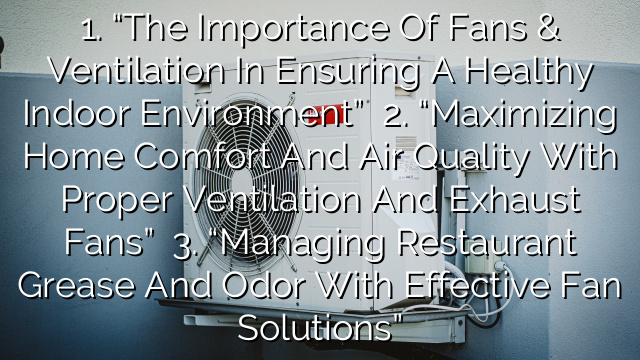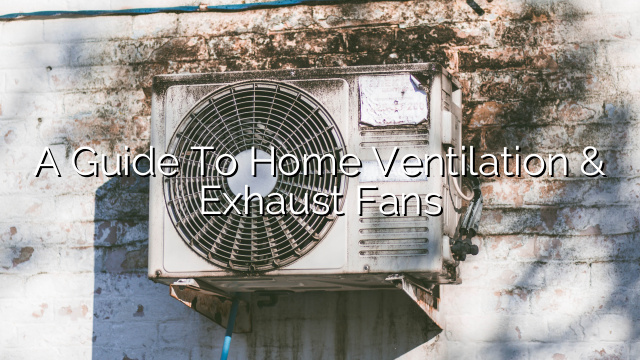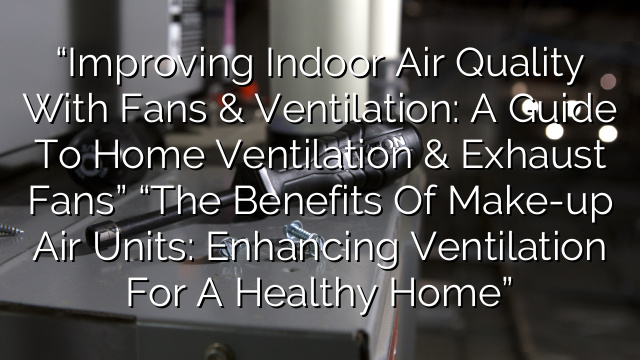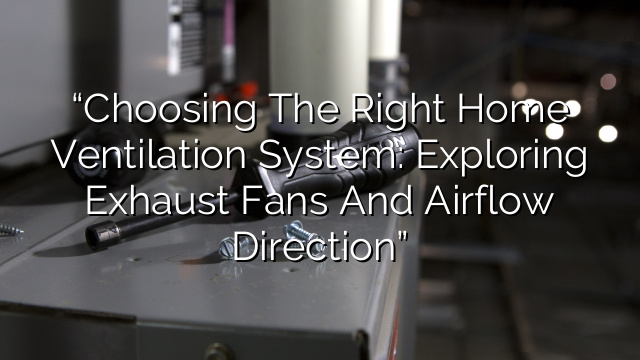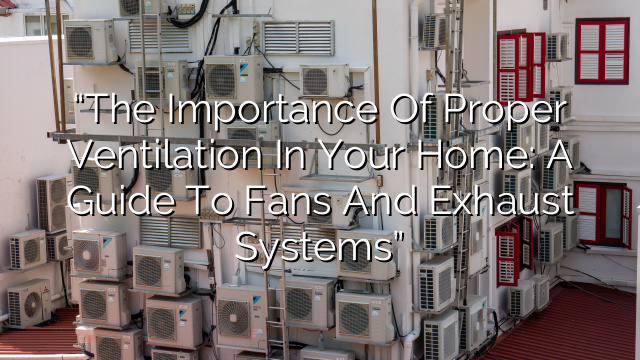1. The Importance of Fans & Ventilation in Ensuring a Healthy Indoor Environment
When it comes to creating a healthy indoor environment, proper ventilation is key. Fans play a crucial role in ensuring that the air inside our homes and buildings is clean and fresh. From exhaust fans to ventilation systems, these devices help to remove pollutants, control temperature, and improve overall air quality. Let’s explore the importance of fans and ventilation in maintaining a healthy indoor environment.
Why is ventilation important?
Proper ventilation is necessary to maintain a healthy indoor environment for several reasons:
- Removes indoor pollutants: Indoor air can contain a variety of pollutants, such as dust, allergens, and volatile organic compounds (VOCs). These pollutants can accumulate over time and have adverse effects on our health, causing respiratory issues, allergies, and even long-term health problems. Ventilation systems help to remove these pollutants and maintain a cleaner and healthier indoor environment.
- Controls humidity levels: High humidity levels can lead to the growth of mold and mildew, which can cause respiratory issues and allergies. On the other hand, low humidity levels can cause dryness, irritation, and even damage to furniture and woodwork. Proper ventilation helps to control and maintain optimal humidity levels, preventing the growth of mold while keeping the indoor environment comfortable and healthy.
- Reduces odors: Indoor spaces can often have unpleasant odors due to cooking, pets, or other activities. Proper ventilation, especially in areas like kitchens and bathrooms, helps to remove odors and maintain a fresh and clean-smelling indoor environment.
- Prevents condensation and moisture buildup: Inadequate ventilation can lead to condensation and moisture buildup on windows, walls, and ceilings. This can result in the growth of mold, damage to building materials, and even structural issues. Effective ventilation systems help to remove excess moisture, preventing condensation and the associated problems.
The role of fans in ventilation
Fans are an essential component of ventilation systems. They help to circulate air, remove stale air, and introduce fresh air into indoor spaces. Here are the key roles fans play in ensuring proper ventilation:
- Exhaust fans: Exhaust fans are commonly used in kitchens, bathrooms, and other areas prone to high humidity and odors. These fans help to remove stale air, moisture, and odors from the room and expel them outside. By effectively removing polluted air, exhaust fans contribute to a healthier and more comfortable indoor environment.
- Whole-house ventilation systems: Whole-house ventilation systems, such as heat recovery ventilators (HRVs) and energy recovery ventilators (ERVs), are designed to provide fresh air throughout the entire house. These systems use fans to exhaust stale indoor air and bring in fresh outdoor air while recovering the heat or energy from the expelled air. By continuously exchanging indoor and outdoor air, whole-house ventilation systems help to maintain a healthier and cleaner indoor environment.
- Ceiling fans and floor fans: Ceiling fans and floor fans are not only useful for creating a breeze and providing cooling during hot summer months but also aid in overall ventilation. These fans help to improve air circulation, prevent stagnant air pockets, and distribute conditioned air more effectively. By enhancing air movement, these fans contribute to a fresher and more comfortable indoor environment.
2. Maximizing Home Comfort and Air Quality with Proper Ventilation and Exhaust Fans
Proper ventilation and the use of exhaust fans are essential for maximizing home comfort and air quality. Here’s how you can achieve this:
Creating a comfortable indoor environment
Proper ventilation and the use of exhaust fans play a key role in creating a comfortable indoor environment:
- Controlling temperature: Ventilation systems with fans help to regulate temperature by exchanging indoor air with fresh outdoor air. This is particularly beneficial during hot summer months when proper ventilation can help to cool down the indoor environment.
- Reducing humidity: High humidity levels can make a home feel uncomfortable and sticky. Exhaust fans, such as bathroom fans and kitchen range hoods, help to remove excess moisture, reducing humidity levels and creating a more pleasant indoor environment.
- Improving air circulation: Ceiling fans and floor fans help to improve air circulation, making the indoor environment feel fresher and more comfortable. They can also help to distribute conditioned air more evenly, reducing hot and cold spots.
Enhancing air quality
Proper ventilation and the use of exhaust fans significantly contribute to improving indoor air quality:
- Removing pollutants: Ventilation systems with exhaust fans help to remove pollutants such as dust, allergens, and VOCs from the indoor environment. This helps to reduce the risk of respiratory issues, allergies, and other health problems associated with poor air quality.
- Exhausting odors: Exhaust fans, especially in kitchens and bathrooms, help to remove unpleasant odors from the indoor environment. This helps to maintain a fresh and clean-smelling space.
- Preventing mold and mildew: Proper ventilation, especially in areas prone to high moisture levels, helps to control humidity and prevent the growth of mold and mildew. This not only improves air quality but also protects the integrity of the building materials.
3. Managing Restaurant Grease and Odor with Effective Fan Solutions
In restaurants and commercial kitchens, managing grease and odor is of utmost importance. Effective fan solutions play a crucial role in keeping the environment clean, safe, and odor-free. Here’s how restaurant grease fans contribute to achieving this:
Importance of restaurant grease fans
Restaurant grease fans, also known as kitchen exhaust fans or range hoods, are specially designed to remove grease, smoke, and odors produced during cooking. These fans are essential for maintaining a healthy indoor environment in commercial kitchens for several reasons:
- Removes grease and smoke: The primary purpose of restaurant grease fans is to remove grease particulates and smoke that are generated during cooking processes. Grease particles and smoke can accumulate in the air and on surfaces, leading to poor air quality, unpleasant odors, and fire hazards. Grease fans effectively capture and exhaust these pollutants, keeping the kitchen clean and safe.
- Improves ventilation: Restaurant kitchens produce a significant amount of heat due to cooking equipment. Grease fans not only remove grease and smoke but also help to reduce temperature buildup by exhausting hot air. This improves the overall ventilation in the kitchen, making it more comfortable for staff and customers.
- Enhances fire safety: Grease buildup on surfaces and ventilation ducts can pose a fire hazard. Restaurant grease fans help to prevent grease-related fires by effectively capturing grease particles and removing them from the air and surfaces. Regular maintenance and cleaning of grease fans are crucial to ensure their optimal performance and reduce the risk of fire.
Choosing the right restaurant grease fans
When selecting restaurant grease fans, it’s important to consider the following factors:
- Airflow capacity: The fan’s airflow capacity should match the specific needs of the kitchen. It should be able to effectively capture and exhaust the grease, smoke, and odors produced during cooking.
- Grease containment: Look for grease fans with effective containment systems, such as grease cups or removable grease filters. These features help to collect grease particles and make cleaning and maintenance easier.
- Noise level: Commercial kitchens can be loud, so it’s crucial to choose grease fans with low noise levels to avoid additional noise pollution. Proper insulation and noise-reducing features can help to minimize noise without compromising performance.
- Energy efficiency: Choose grease fans that are energy-efficient to minimize operating costs and reduce environmental impact. Look for fans with energy-saving features and high-efficiency motors.
FAQs
Q: How often should I clean the filters on my home exhaust fans?
A: The frequency of cleaning depends on factors such as usage, cooking habits, and the level of pollutants in the kitchen. Generally, it’s recommended to clean the filters every 1-3 months to ensure optimal performance and maintain good air quality. Follow the manufacturer’s instructions for specific cleaning guidelines.
Q: Can ceiling fans be used as a substitute for air conditioning?
A: Ceiling fans can provide additional cooling and improve comfort in conjunction with air conditioning, but they cannot replace the cooling effect of an air conditioner. Ceiling fans create a wind chill effect on the skin, making you feel cooler by evaporating moisture on your skin. However, they do not actually lower the temperature of the room. Therefore, it’s best to use ceiling fans in combination with air conditioning to maximize comfort and energy efficiency.
Q: Do all restaurants need to have grease fans?
A: The need for grease fans in a restaurant depends on the type of cooking and the local building codes. However, it is highly recommended for all restaurants and commercial kitchens to have effective grease exhaust systems in place to comply with health and safety regulations, maintain a clean environment, and reduce the risk of fire.
Q: Can I install exhaust fans in a bathroom without windows?
A: Yes, it is possible to install exhaust fans in bathrooms without windows. In fact, it is highly recommended to have an exhaust fan in windowless bathrooms to remove excess moisture, prevent mold growth, and improve air quality. However, proper venting to the outside is crucial to ensure that the humid air is effectively expelled outside the building.

